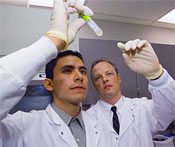Using Your Resume to Land a Job as a Scientist
|
|
 | |
| Knowing what to emphasize in your scientist resume will greatly increase its potency. |
When it comes time to write your resume with the intent of obtaining a job in the science industry, the important thing to understand is what the employing company is currently looking for in a scientist. You must research and find out what skills are needed, what the requirements are, and what responsibilities the open position consists of. When you understand the requirements of the position you are applying for, you can tailor your resume to highlight those skills that demonstrate your ability in a way that will draw your employer's attention, making your resume a success.
The first step is to draft a ''master'' resume that contains every skill, experience, and qualification you possess. This is regardless of whether or not the skills and items listed apply to the job for which you are applying. The purpose of this master resume is to form a comprehensive inventory which will be useful down the road should you ever need to rely upon it.
Once the master resume has been written, take it and trim it down to a short summary of your capabilities. Only those items that apply to the position you are applying for should remain. This process will adapt your resume into one your potential employer will desire when going through resumes. By the time you go in for the interview, the employer will have a more complete picture of your capabilities and expertise; the resume is there to get your foot in the door and make it to the interview.
The length of your resume should be kept to one or two pages. If you are a recent graduate entering the scientist profession for the first time, one page should be the maximum length. For most entry level positions, the sheer number of applicants means your resume should be short, to the point, and stand out amongst the rest. If you have ten or more years of experience, a two page resume outlining your work history is research is acceptable.
If you are applying for an entry level position, even if you have a lot of experience, you will be competing with a large number of other applicants. This is the time to really stand out from the other applicants with a powerful resume. Your resume should be short because the person reviewing the resumes will be reading so many that they will lose interest if the resume is too long. By keeping the resume short, the reviewer will be more likely to read with attentiveness and better understand how you will be perfect for the job.
If you are transferring from one career path to another, your education and skill set may no longer apply directly to the profession you are entering. This may seem like a hindrance, but with some thought and creativity, you'll quickly find that skills you possess can readily apply to other professions as well. For example, a machinist who would put, ''the ability to quickly determine the part that needs to be machined,'' could re-frame the skill as, ''an ability to swiftly determine the solution for a given problem, with understanding of the constraints involved.'' That second skill description could not only apply to a scientist position, but also to any number of other professions where problem solving is important.
If you are applying with little or no job experience, the focus of your resume should shift towards certifications received and schooling. When describing the education you’ve received, many skills used in attending college and receiving certification can be translated as above into skills that will apply to being a scientist. You may also consider listing courses and research projects done that relate directly to the position at hand. Certifications are especially good if they are state or nationally endorsed, as that is a sponsored statement of your expertise in the field. Not having experience does not have to hinder your application process.
A final thing that will help is the use of professional jargon. Not only does it convey an understanding of the field, but the reviewer will read the resume and apply your skills to the job requirements easily and quickly, since they are already in their ''working language.'' This can really allow the resume to stand out, but it is a double edged sword. Using too much jargon will cause the resume to seem like too much fluff and not enough substance. This will send your resume into the rejected pile very quickly. A good way to gauge is to hold conversations with people in the field and get a feel for the language.
Writing a resume for a scientist position is an important part of the process. It is what will get your foot in the door, and what will allow the interviewers to take the time to truly find out what you will contribute to the company.




